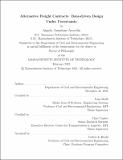Alternative Freight Contracts: Data-driven Design Under Uncertainty
Author(s)
Acocella, Angela Josephine
DownloadThesis PDF (39.46Mb)
Advisor
Sheffi, Yossi
Caplice, Chris
Terms of use
Metadata
Show full item recordAbstract
We demonstrate how firms (shippers) should incorporate market uncertainty into their strategic procurement of truckload (TL) transportation services from suppliers (carriers). These direct point-to-point TL movements are a major segment of total freight volumes for shippers. As such, firms emphasize the need to form strong relationships with their carriers. This becomes difficult due to the two-sided, non-binding nature of TL contacts; shippers are not required to offer the stated contract volumes - causing uncertainty and cost escalations for carriers - and carriers are not required to accept the offered freight - forcing shippers to rely on higher priced backup providers. These costs intensify when freight markets cycle between periods of over and under supply; soft and tight markets, respectively.
We propose an empirical modeling approach utilizing large, detailed microeconomic data sets to help shippers and carriers form better contractual relationships given present uncertainties. Previous research on TL procurement and operations has predominantly taken analytical approaches due to limited availability of real-world industry data. Thus, it has been limited in addressing the three sources of uncertainty: (1) demand from shippers, (2) capacity supplied by carriers, and (3) the fluctuations in the freight market that shift the power back and forth between parties.
This thesis provides six main contributions. First, we explicitly incorporate the three sources of uncertainty into shippers' TL transportation contracting decisions by developing empirical behavioral models. Second, we confirm when the underlying structure of the freight markets change and impact carrier behaviors. Third, we identify which actions shippers can take to encourage contracted carriers to maintain high freight acceptance rates during tight markets. Fourth, we quantify carriers' contract price stickiness and identify which segments of a shipper's network and carrier base are most promising for a market-based contract to mitigate the negative effects of market fluctuations on cost and performance levels. Fifth, we determine the market-based contract designs that result in a Pareto improvement for both shippers and carriers over the traditional long-term, fixed-price contract and quantify the expected benefit to both sides. Finally, we measure the causal effect of index-based contracts on the service levels and costs shippers experience.
Date issued
2022-02Department
Massachusetts Institute of Technology. Department of Civil and Environmental EngineeringPublisher
Massachusetts Institute of Technology